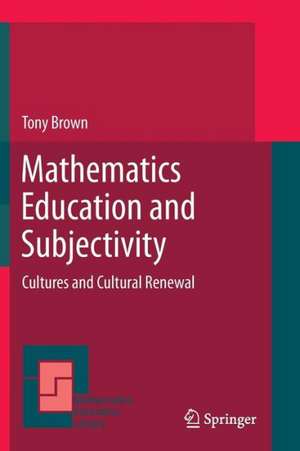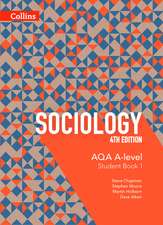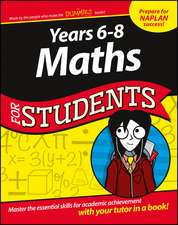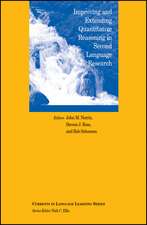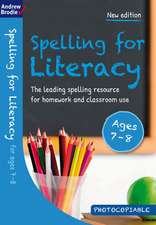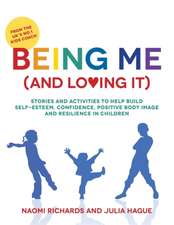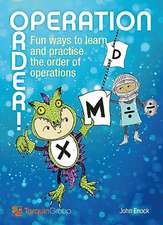Mathematics Education and Subjectivity: Cultures and Cultural Renewal: Mathematics Education Library, cartea 51
Autor Tony Brownen Limba Engleză Paperback – 27 noi 2013
| Toate formatele și edițiile | Preț | Express |
|---|---|---|
| Paperback (1) | 637.28 lei 6-8 săpt. | |
| SPRINGER NETHERLANDS – 27 noi 2013 | 637.28 lei 6-8 săpt. | |
| Hardback (1) | 643.34 lei 6-8 săpt. | |
| SPRINGER NETHERLANDS – 9 iul 2011 | 643.34 lei 6-8 săpt. |
Din seria Mathematics Education Library
-
 Preț: 389.70 lei
Preț: 389.70 lei - 15%
 Preț: 645.96 lei
Preț: 645.96 lei - 18%
 Preț: 742.97 lei
Preț: 742.97 lei - 18%
 Preț: 1394.84 lei
Preț: 1394.84 lei - 18%
 Preț: 942.10 lei
Preț: 942.10 lei - 18%
 Preț: 1544.80 lei
Preț: 1544.80 lei - 15%
 Preț: 652.49 lei
Preț: 652.49 lei - 18%
 Preț: 1325.82 lei
Preț: 1325.82 lei - 18%
 Preț: 1225.48 lei
Preț: 1225.48 lei - 15%
 Preț: 643.34 lei
Preț: 643.34 lei - 18%
 Preț: 1221.07 lei
Preț: 1221.07 lei - 18%
 Preț: 952.89 lei
Preț: 952.89 lei - 18%
 Preț: 950.52 lei
Preț: 950.52 lei - 24%
 Preț: 1445.43 lei
Preț: 1445.43 lei - 18%
 Preț: 1224.54 lei
Preț: 1224.54 lei - 15%
 Preț: 651.19 lei
Preț: 651.19 lei -
 Preț: 391.61 lei
Preț: 391.61 lei - 18%
 Preț: 948.16 lei
Preț: 948.16 lei - 18%
 Preț: 944.19 lei
Preț: 944.19 lei - 18%
 Preț: 1380.95 lei
Preț: 1380.95 lei - 18%
 Preț: 947.85 lei
Preț: 947.85 lei - 18%
 Preț: 948.61 lei
Preț: 948.61 lei - 15%
 Preț: 635.31 lei
Preț: 635.31 lei - 15%
 Preț: 644.63 lei
Preț: 644.63 lei - 15%
 Preț: 646.43 lei
Preț: 646.43 lei - 15%
 Preț: 647.59 lei
Preț: 647.59 lei
Preț: 637.28 lei
Preț vechi: 749.73 lei
-15% Nou
Puncte Express: 956
Preț estimativ în valută:
121.96€ • 126.86$ • 100.68£
121.96€ • 126.86$ • 100.68£
Carte tipărită la comandă
Livrare economică 15-29 aprilie
Preluare comenzi: 021 569.72.76
Specificații
ISBN-13: 9789400737440
ISBN-10: 9400737440
Pagini: 228
Ilustrații: XI, 216 p.
Dimensiuni: 155 x 235 x 12 mm
Greutate: 0.33 kg
Ediția:2011
Editura: SPRINGER NETHERLANDS
Colecția Springer
Seria Mathematics Education Library
Locul publicării:Dordrecht, Netherlands
ISBN-10: 9400737440
Pagini: 228
Ilustrații: XI, 216 p.
Dimensiuni: 155 x 235 x 12 mm
Greutate: 0.33 kg
Ediția:2011
Editura: SPRINGER NETHERLANDS
Colecția Springer
Seria Mathematics Education Library
Locul publicării:Dordrecht, Netherlands
Public țintă
ResearchCuprins
About the author. - Acknowledgements. - 1 Introduction. – 2 The regulation of spatial perception.- 3 Cultural mediation of mathematics.- 4 Teacher conceptions of curriculum. 5 Subjectivity in mathematics education research.- 6 Lacanian subject of mathematical learning.- 7 The cultural renewal of mathematical learning.- 8 The political shaping of mathematical learning.- 9 Concluding remarks.- References.- Index.
Notă biografică
Originally from London, Tony Brown was educated in Canterbury and Exeter, before moving to Holland Park School in central London where he taught mathematics for three years. This was followed by three years as a mathematics teacher educator for Volunteer Services Overseas in Dominica in the Caribbean. In 1987 he completed his PhD at Southampton University. His doctoral research focused on language usage in mathematics classrooms, especially where the fluent use of English could not be assumed. After a spell as a mathematics coordinator in a middle school on the Isle of Wight, Tony moved to Manchester Metropolitan University in 1989. Tony has been the leader for doctoral studies in education as well as participating in a range of other courses and became Professor of Mathematics Education in 2000. Projects have included: Economic and Social Research Council funded studies examining teacher education; piloting a distance-teaching programme enabling British volunteers based in Africa to research their own teaching practice within a programme of professional development; and, a General Medical Council funded project on how senior doctors learn. Tony also spent two years on leave from Manchester at the University of Waikato where he became the first Professor of Mathematics Education in New Zealand. There he led a project funded by the New Zealand Council for Educational Research on the experiences of Pasifika teachers working in New Zealand schools.
Tony has published two other books in the Mathematics Education Library series. Mathematics education and language outlines his interest in mathematics in schools. Becoming a mathematics teacher (with Olwen McNamara) considers the formation of practices of new primary school teachers. Meanwhile, Action research and postmodernism (with Liz Jones) provides a theoretical perspective on teachers carrying out practitioner research within higher degrees. Regulativediscourses in education (with Dennis Atkinson and Janice England) considers teacher practices through psychoanalytic theory. The psychology of mathematics education, edited by Tony, introduces psychoanalytic theory as an alternative to more cognitive understandings of psychology. Tony has also written extensively in journals such as Educational Studies in Mathematics, for the learning of mathematics and the British Educational Research Journal.
Tony has published two other books in the Mathematics Education Library series. Mathematics education and language outlines his interest in mathematics in schools. Becoming a mathematics teacher (with Olwen McNamara) considers the formation of practices of new primary school teachers. Meanwhile, Action research and postmodernism (with Liz Jones) provides a theoretical perspective on teachers carrying out practitioner research within higher degrees. Regulativediscourses in education (with Dennis Atkinson and Janice England) considers teacher practices through psychoanalytic theory. The psychology of mathematics education, edited by Tony, introduces psychoanalytic theory as an alternative to more cognitive understandings of psychology. Tony has also written extensively in journals such as Educational Studies in Mathematics, for the learning of mathematics and the British Educational Research Journal.
Textul de pe ultima copertă
This book rethinks mathematical teaching and learning with view to changing them to meet or resist emerging demands. Through considering how teachers, students and researchers make sense of their worlds, the book explores how some linguistic and socio-cultural locations link to prevalent conceptions of mathematics education. The locations include classroom mathematics, spatial awareness, media images of mathematics, curriculum development, teacher education and mathematics education research itself. The book introduces cutting edge theories of subjectivity that trouble more familiar psychological theories of “humans” apprehending mathematical “concepts”. Rather, it suggests that our senses of self and of mathematics result from self-reflections within the various localities in which we live. In foregrounding subjectivity the book shows how mathematics can provoke alternative ways of thinking towards enlivening our transformative capacities. Learning itself is depicted as participation in cultural renewal, where the very mathematics encountered is becoming something new. Addressing teachers, teacher educators and researchers, the book invites the reader to contemplate alternative trajectories of change into fresh ways of being.
Caracteristici
Considers how learners and teachers in different cultural settings construct mathematical knowledge as a result of their socially determined needs. Introduces cutting edge theories of subjectivity Shows how mathematics can provoke alternative ways of thinking towards enlivening our transformative capacities
